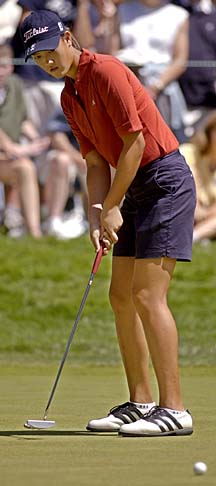
Gathering Place
Peter Caldwell
A lament for lost youth:
Michelle Wie syndromeRecently, I heard a comment on the radio from one of the Golf Channel hosts. After having Michelle Wie and her parents in the studio, he said he had some concerns about her situation. He mentioned that her parents were planning her whole summer based on various events on the mainland, with no down time back home with her friends. What happens when she gets a boyfriend or is old enough to drive? he wondered. Is burnout around the corner?
As a pediatrician, I share his concern. Wie is definitely at risk, and unfortunately I have seen it many times before. Some parents just seem hell-bent on pushing their talented children, and cannot allow them those magical Days of My Youth that Hawaii's Kui Lee once sang about.
ASSOCIATED PRESS
Michelle Wie missed a putt last Sunday on the final day of the U.S. Women's Open in North Plains, Ore.
Once gone, this special period can never be recaptured. Sometimes its loss causes long-term harm no matter how many trophies come home or what kind of big-money contracts are signed. Why do parents have this misplaced zeal? Cynics say they are looking for their child to be a meal ticket or they are hoping for a college scholarship, while others point to a parent trying to experience some athletic glory through their child.
In Michelle's case, of course she is an extraordinary talent and her future remains promising in spite of her parents. She is physically mature for her age, and at this point is handling all the attention very well. But around the corner lurk potential dangers as she really becomes a teenager. Already the signs are there with the on-the-course conflicts with her hovering father -- and he hasn't seen anything yet! What now is new and exciting to Michelle will become less attractive as she strives to live her own life and become more independent.
My instincts tell me that if she were allowed to be normal for her age with some time off, she would do just fine. Many of those mainland appearances can wait without compromising her talent. She is not competing in the never-never land of women's figure skating or gymnastics. Even Tiger Woods, to father Earl's credit, stayed away from competing against adult professionals until he was ready.
On a lesser stage I see the same kind of thing going on in my son's youth baseball league, where sometimes both parents religiously watch their 7- and 8-year-old sons' every practice and never miss a game. Our coaches asked the parents early in the year just to support their kids and leave the coaching to them. Yet some of these people just can't accept the principle that kids need to play for themselves and their own enjoyment, not to please their parents. Instead of just supporting their youngsters no matter what happens, they constantly harp on their mistakes.
Recently, at one of my son's games (my wife and I trade off taking him to his games), I heard an exchange that typifies the problem that Fred Engh wrote about in a very good book titled "Why Johnny Hates Sports." A boy came away from the plate after popping up to the pitcher. His aggravated father called him over to the sidelines and asked, "What did I tell you about doing that? Do you know what you did wrong?"
His son answered, "Yes, Dad," with downcast eyes and a shrug of his shoulders.
His father gave him a Bobby Knight stare and with an irritated voice remarked, "Then why did you do it then?"
Parents, let your kids be kids! They are not miniature Major Leaguers. Allow them to experience the joy of playing just for fun, even in today's world of early-on organized leagues and uniforms with names on the back for 6-year-olds.
As for Michelle's overbearing parents, back off some now while you have the chance. Go back to your own lives and give your gifted daughter some space.
Peter Caldwell is an Oahu pediatrician.
